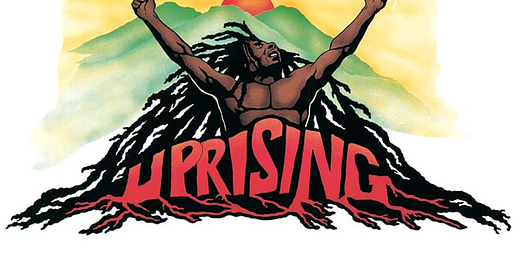One of the things that you can’t escape if you are thinking about ‘Redemption Song’, the concluding track on Bob Marley & the Wailers' 1980 album Uprising, is that it is different from most of the music that Marley produced in his illustrious career but also that it came into fruition during a period when Marley was in the middle of battling cancer and that minimalist, acoustic output was more raw and open than anything, either personal or political he had opined on before.
Unlike almost all of his other songs, ‘Redemption Song’ eschews the reggae rhythms synonymous with Marley's music and the man (arguably, the rhythms are synonymous with Marley himself.). The stripped-down style features only his voice and an acoustic guitar. This simplicity reflects folk influences and is closer in spirit to artists like Bob Dylan, allowing Marley’s poignant lyrics to take centre stage. The song's intimate feel is further highlighted by its lyrical content, inspired by Marcus Garvey's speeches advocating for black self-reliance and psychological liberation. The lines in the song;
Emancipate yourselves from mental slavery; None but ourselves can free our minds
urge an awakening that transcends physical oppression and from this Garvey speech.
We are going to emancipate ourselves from mental slavery because whilst others might free the body, none but ourselves can free the mind. Mind is your only ruler, sovereign. The man who is not able to develop and use his mind is bound to be the slave of the other man who uses his mind
The rest of Marley's lyrics parallel historical enslavement and contemporary societal shackles, urging a form of liberation that is as much about personal empowerment as it is about societal transformation. The song's introspection is believed to be influenced by Marley’s confrontation with mortality. This poignancy is amplified by the song’s acoustic clarity, which lays bare his raw, emotional vocal delivery.
This track closes the Uprising album and is a profound epilogue to Marley's career; At the same time, there would be one final studio album to come in the shape of 1983’s Confrontation; as far as studio albums go, this was the last one in his lifetime. The song is an encapsulation of his philosophical and revolutionary ideas. The solo version remains most impactful, stark in its simplicity and powerful message, which has allowed it to resonate with diverse audiences worldwide, transcending generations.
‘Redemption Song’ has been covered by a myriad of artists across various genres worldwide and used as a rallying cry in movements for freedom and justice. It is in Rolling Stone's most recent update of their 500 Greatest Songs of All Time at 42 after finishing outside the top 50 in previous editions. It is the highest Marley song on the list and the highest reggae or reggae-adjacent on the list.
As one of Marley’s final recordings, ‘Redemption Song’ is often interpreted as his farewell message to the world, an antidote to slavery, both mental and physical —a final testament to his enduring spirit and unyielding commitment to spreading messages of love, peace, and resistance against oppression. It underscores the transcendental power of music to inspire change and foster a deeper understanding of our shared humanity.
Marley had already recorded a version of this freedom hymn with his band.
When Island Records chief Chris Blackwell suggested he try it as an acoustic-style folk tune, which is what we know now. Marley is meant to have said he would love to do more like that, but unfortunately, time was not on his side. The rest of the album had fuller and richer instrumentation.
With ‘Redemption Song’, Bob Marley distilled the essence of his artistic and ideological pursuits into one final serene and stirring ballad, leaving an indelible mark on the hearts and minds of listeners. Its placement as the closing track on Uprising celebrates the album's themes of struggle (as found in ‘Coming In From The Cold’ and ‘Bad Card’) and liberation (which are evident in ‘Zion Train’ and ‘Could You Be Loved’). It encapsulates the spirit of a man whose life and music were dedicated to the fight for a fairer world. As much as it is a song of closure, there is hope—a reminder that liberation begins in the mind, and through music, we can strive for a universal language of resistance and renewal.





Wonderful tribute here Mitchell
Excellent article, as ever.